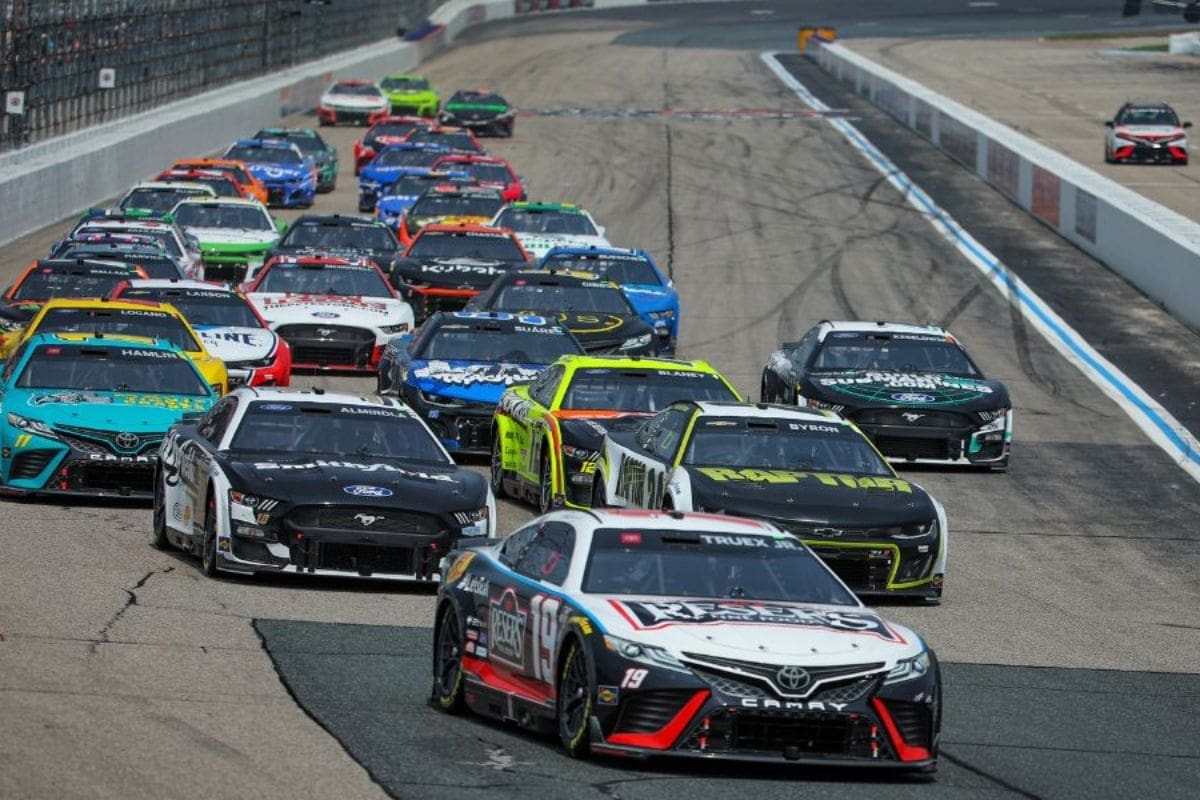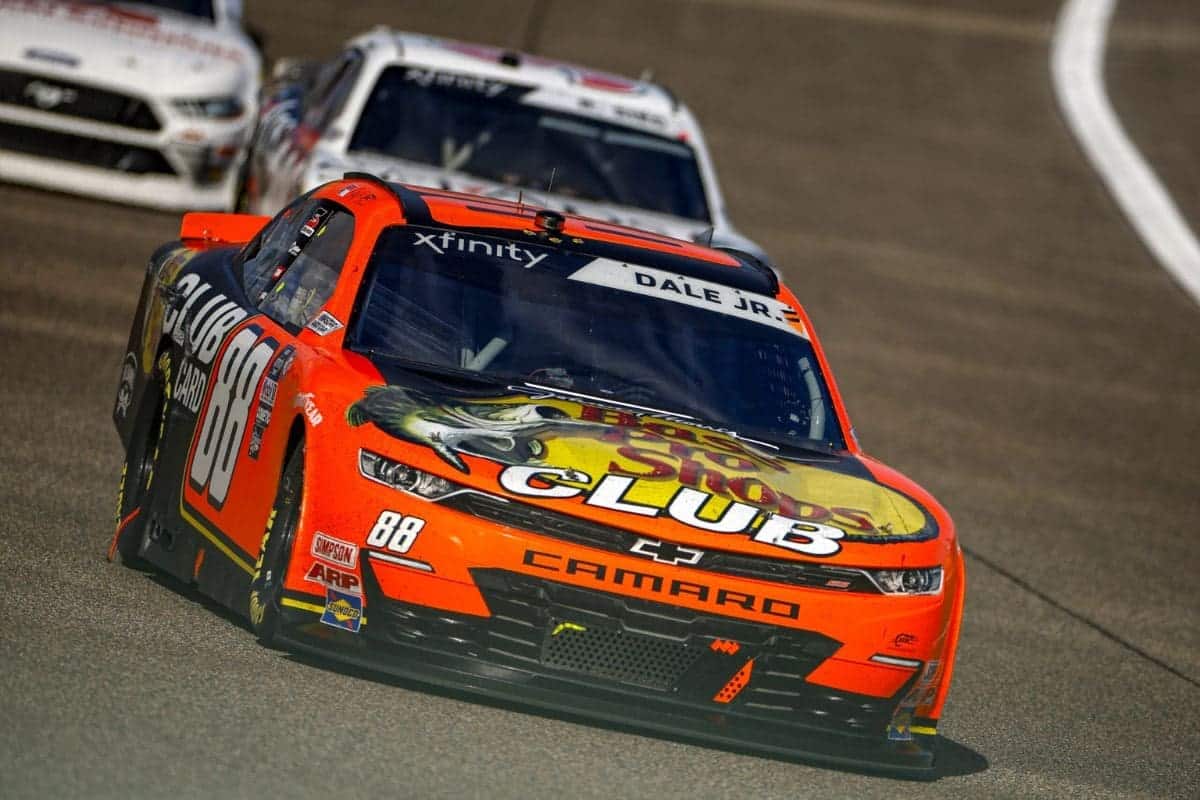JR Motorsports Questions: Kelley Earnhardt, the CEO and co-owner of JR Motorsports (JRM) alongside her brother Dale Earnhardt Jr., has recently expressed significant concerns regarding the escalating costs and questionable value of NASCAR charters. Despite their apparent worth on paper, Earnhardt argues that running a Cup team is not a profitable venture under the current business model. As Stewart-Haas Racing prepares to sell their four-car Cup charter at the end of the season, speculation has risen about JRM’s potential interest. However, Kelley Earnhardt’s reservations highlight the inherent risks and long-term uncertainties associated with such investments.
Kelley Earnhardt Raises Concerns Over NASCAR Charter Investments
Kelley Earnhardt, the chief executive officer and co-owner of JR Motorsports alongside her brother Dale Earnhardt Jr., has voiced significant concerns about the escalating costs and questionable value of charters in NASCAR’s top-level series. Despite the apparent value of these charters on paper, Earnhardt argues that running a Cup team is not a profitable venture. With Stewart-Haas Racing set to sell their four-car Cup charter at the end of the season, speculation has arisen about JRM’s potential interest. However, Earnhardt’s apprehensions highlight the inherent risks and unsure long-term value associated with such an investment.
The issue at hand is the high cost of securing a NASCAR charter. Kelley Earnhardt believes that while charters might appear as valuable assets on balance sheets, the reality is starkly different. Running a Cup team involves substantial financial commitments without guaranteed returns, making it a challenging business model. Earnhardt’s perspective is rooted in the practical aspects of racing management.

In a candid conversation with former NASCAR driver Kenny Wallace, Kelley Earnhardt elaborated on JRM’s hesitation to invest $30 million in a Cup charter. She pointed out that while charters are listed as appreciating assets, the profitability of running a Cup team remains highly questionable. The business model, according to Earnhardt, does not ensure consistent financial returns, making such a hefty investment risky. Her comments reflect a cautious approach, prioritizing long-term financial stability over immediate expansion into the Cup series.
From "@Kenny_Wallace Conversation," @EarnhardtKelley explains the #NASCAR charter system & why she & @DaleJr aren't Cup owners … yet. pic.twitter.com/8UJskntqzi
— The Kenny Wallace Show (@KWallaceShow) June 16, 2024
Financial Realities of NASCAR Charters
Kelley Earnhardt’s reservations are not unfounded. The financial landscape of NASCAR charters is complex and fraught with challenges. Despite their perceived value, charters do not inherently guarantee profitability. Earnhardt’s comments shows the importance of a sustainable business model, especially when considering significant financial commitments like purchasing a charter. The cost of running a competitive team can quickly escalate, making it imperative to carefully assess the financial viability of such investments.
“They sit on your balance sheet as an appreciating asset nobody knows what to pay for them because the business model to running a Cup team is not a profitable business model.”
“I can’t tell you that my Cup team will make $2 million every year and there’s a value in that I mean what everybody wants to be in business to make money. They’re essentially worth nothing because this contract’s about to expire that they’re working on.” – Kelley
Earnhardt further highlighted the uncertainty surrounding the valuation of charters. The impending expiration of the current contracts adds another layer of risk, as the future value of these charters remains unclear. This uncertainty complicates the decision-making process, as it becomes difficult to justify a $30 million investment without a clear understanding of its long-term worth.
“My problem with it is that it’s not about the value of the charter. I don’t want to pay $30 million for something that I have no clue how to measure its worth. None. I don’t want to pay $30 million for something, and then have to spend $20 million more to run my race team without any guarantee of making a profit.” – Kelley
The high costs associated with maintaining a competitive team further exacerbate these concerns. Beyond the initial investment, teams must allocate substantial resources to ensure optimal performance on the track. This includes everything from vehicle maintenance and crew salaries to travel expenses and marketing efforts. The financial burden can be overwhelming, making it crucial for team owners to weigh the potential returns against the significant expenditures required to compete at the highest level.

Dale Earnhardt Jr.’s Take on Charter Investments
Dale Earnhardt Jr. has also weighed in on the issue, offering additional insights into JRM’s stance on charter investments. In an interview with FOX Sports’ Bob Pockrass, Dale Jr. clarified that JRM is currently not pursuing the purchase of a Cup charter from Stewart-Haas Racing. He described the charter market as cyclical, noting that JRM missed the most recent cycle and expressing uncertainty about future opportunities.
“We’re out of the charter business right now. … The sale of a charter—I would call it a cycle, right? Well, we missed this last cycle.” – Dale Jr
Dale Jr.’s remarks shed light on the broader context of charter investments. He acknowledged the potential benefits of securing a charter but stressed the importance of timing and market conditions. By taking a measured approach, JRM aims to ensure that any future investments align with their long-term goals and financial stability. This perspective highlights the importance of strategic planning in an industry where financial decisions can have far-reaching implications.
“We’ll see what comes down the road. I’m almost feeling like that if I were to ever get involved in the Cup side, it would be like an investment — my personal monetary investment in something current.” – Dale Jr
The Earnhardt family’s involvement in NASCAR adds another layer of complexity to the discussion. Their legacy in the sport brings both expectations and scrutiny, making it essential to carefully consider each move. Dale Jr.’s comments reflect a commitment to maintaining the integrity and competitiveness of JRM while navigating the challenges of the modern racing landscape.
Weighing the Risks and Rewards
The decision to invest in a NASCAR charter is not one to be taken lightly. The risks associated with such a significant financial commitment are substantial, and the potential rewards are not guaranteed. Kelley Earnhardt’s concerns highlight the need for a thorough evaluation of the financial viability of charter investments. Her cautious stance reflects a broader trend within the industry, as team owners and executives seek to balance growth with sustainability.
One of the key challenges is the unpredictability of the racing environment. Factors such as team performance, sponsorship deals, and market conditions can all impact the financial returns of a charter investment. This uncertainty makes it difficult to forecast the long-term value of a charter, adding another layer of complexity to the decision-making process. By taking a cautious approach, Kelley Earnhardt aims to mitigate these risks and ensure the long-term stability of JRM.
The potential benefits of securing a charter are also worth considering. A charter can provide a team with guaranteed entry into races, which can enhance visibility and attract sponsorships. However, these benefits must be weighed against the substantial costs and financial risks involved. Kelley Earnhardt’s analysis underscores the importance of a balanced approach, taking into account both the immediate opportunities and the long-term implications of such investments.
The Future of JRM in the Cup Series
As JRM continues to evaluate its options, the future of the team in the NASCAR Cup Series remains uncertain. Kelley Earnhardt’s cautious approach reflects a broader concern about the sustainability of the current charter system. By prioritizing financial stability and long-term planning, JRM aims to navigate the challenges of the modern racing landscape while maintaining its competitive edge.
The Earnhardt family’s legacy in NASCAR adds a unique dimension to this discussion. Their involvement in the sport brings both opportunities and challenges, making it essential to carefully consider each decision. As JRM looks to the future, the focus will be on strategic growth and sustainable success. Kelley and Dale Earnhardt Jr. are committed to ensuring that any future investments align with their long-term goals and the financial stability of the team.
In the meantime, JRM will continue to compete in the Xfinity Series and other racing series, building on its success and reputation. The decision to hold off on purchasing a Cup charter reflects a thoughtful and measured approach, prioritizing long-term sustainability over immediate expansion. As the team navigates the complexities of the racing world, the focus will remain on delivering competitive performances and maintaining the integrity of the Earnhardt legacy.

News in Brief : JR Motorsports Questions
As JR Motorsports continues to navigate the complexities of NASCAR’s financial landscape, the decision to invest in a Cup charter remains fraught with challenges. Kelley Earnhardt’s cautious approach, emphasizing financial prudence and long-term sustainability, reflects a broader concern within the industry about the current charter system.
With Dale Earnhardt Jr. echoing these sentiments, JRM is prioritizing strategic planning and competitive integrity over immediate expansion. As the team looks to the future, the focus will remain on maintaining their success in the Xfinity Series while carefully evaluating opportunities for growth in the Cup Series. The Earnhardt family’s legacy in NASCAR ensures that their decisions will continue to shape the sport’s landscape, balancing tradition with the demands of modern racing.
